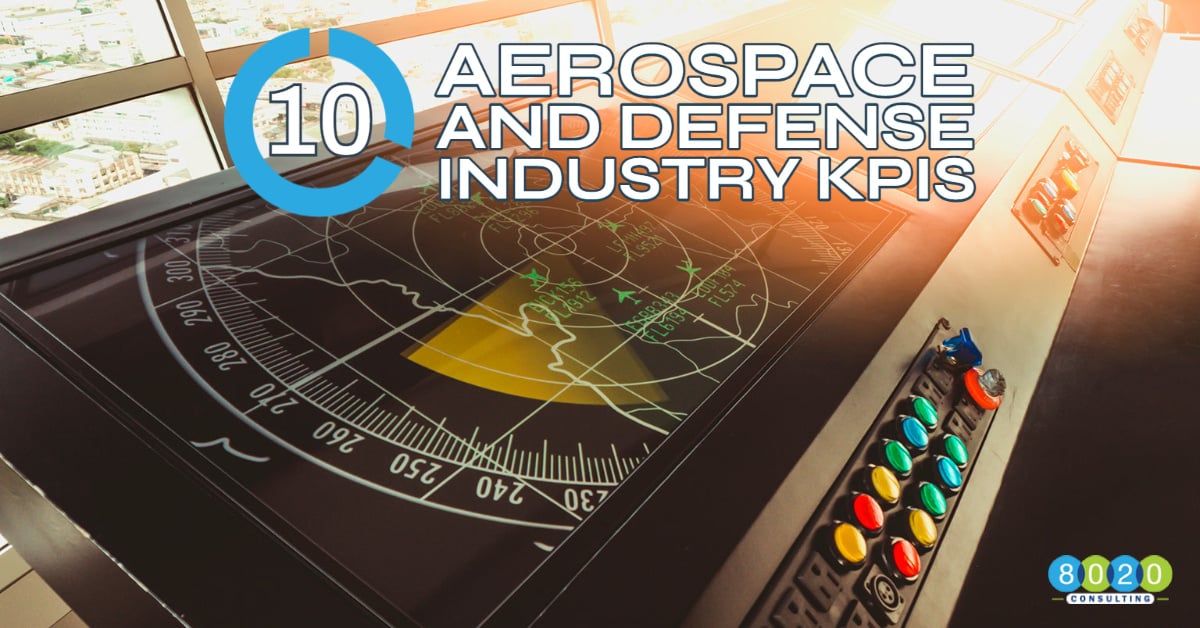
The aerospace and defense industry stands as a testament to human ingenuity, innovation and determination to push the boundaries of what is possible. As one of the most technologically advanced and challenging sectors, it plays a crucial role in shaping the modern world and ensuring global security. From cutting-edge aircraft and spacecraft to advanced defense systems, the industry’s endeavors require precision, efficiency and unwavering commitment to excellence. In this dynamic and high-stakes landscape, aerospace and defense finance professionals leverage Key Performance Indicators (KPIs) as their guiding compass. These metrics provide valuable insights into operational performance, financial health, and strategic decision-making, making them indispensable tools for success. Unlike in many other industries, aerospace and defense companies operate under unique conditions that demand rigorous monitoring and optimization of various aspects to thrive in the competitive and constantly evolving environment.
1. Sales, EBIT and Bookings
KPI Definition: Sales, EBIT (Earnings Before Interest and Taxes) and Bookings are financial metrics that measure revenue generation, profitability, and the inflow of new contracts.
Why it Matters in Aerospace and Defense Finance: The aerospace and defense industry involves massive investments and long project timelines. Tracking these KPIs allows companies to assess their financial health, identify growth opportunities and secure contracts, which are vital to sustaining operations and remaining competitive.
2. Variable Cost / Router Standard Hours – Effectiveness
KPI Definition: This metric measures variable costs per router standard hour, providing insights into the effectiveness of resource allocation.
Why it Matters in Aerospace and Defense Finance: Aerospace and defense projects are complex and require meticulous resource management. By optimizing variable costs, companies can enhance production efficiency, ensure cost-effective operations and maintain a competitive edge in the market.
3. Router Standard Hours / Actual Hours – Efficiency
KPI Definition: This KPI compares router standard hours with actual hours spent on production, highlighting production efficiency.
Why it Matters in Aerospace and Defense Finance: In the aerospace and defense industry, where precision and adherence to timelines are critical, monitoring production efficiency enables organizations to identify inefficiencies, streamline processes and deliver projects on time while maintaining the highest quality standards.
4. Fixed Cost
KPI Definition: Fixed costs represent expenses that remain relatively stable regardless of project volume.
Why it Matters in Aerospace and Defense Finance: The long-term nature of aerospace and defense projects demands careful management of fixed costs. By controlling these expenses, companies can weather fluctuations in demand, ensure financial sustainability and remain profitable throughout extended project timelines.
5. SG&A Cost
KPI Definition: Selling, General and Administrative expenses represent a significant portion of overall costs for aerospace and defense companies.
Why it Matters in Aerospace and Defense Finance: The aerospace and defense industry operates in a competitive and regulated landscape. By monitoring SG&A costs, companies can optimize operational efficiency, allocate resources effectively and improve their competitiveness in the market.
6. PPV Cost
KPI Definition: Purchase Price Variance reflects the efficiency of the supply chain by comparing targeted purchase prices with actual invoice prices.
Why it Matters in Aerospace and Defense Finance: In an industry where cost control significantly impacts overall project costs and profitability, tracking PPV helps organizations identify opportunities to optimize procurement processes, negotiate better prices and manage suppliers more effectively.
7. Scrap Cost
KPI Definition: Scrap costs measure both in-process and out-of-process wastage, reflecting the efficiency of material utilization.
Why it Matters in Aerospace and Defense Finance: Precision and reliability are paramount in aerospace and defense manufacturing. By minimizing scrap costs, companies can optimize resource utilization, reduce material waste and ensure cost-effective production.
8. Customer Order Delinquencies
KPI Definition: This metric tracks timely delivery of customer orders, reflecting customer satisfaction and operational efficiency.
Why it Matters in Aerospace and Defense Finance: In an industry that prioritizes precision and reliability, on-time delivery is crucial for maintaining strong customer relationships, securing repeat business and upholding a positive reputation in the market.
9. Annualized Sales / FTE
KPI Definition: This metric calculates annualized sales over Full-Time Equivalent (FTE) to optimize workforce and resource allocation.
Why it Matters in Aerospace and Defense Finance: Aerospace and defense projects experience demand fluctuations. By optimizing FTE and resource allocation, companies can adapt to varying demands, ensuring operational efficiency and maintaining productivity.
10. Working Capital (Capex, AP, AR)
KPI Definition: Working capital management involves balancing capital expenditure (Capex), accounts payable (AP), and accounts receivable (AR).
Why it Matters in Aerospace and Defense Finance: Efficient working capital management is crucial for smooth project execution, mitigating financial risks and ensuring the ability to invest in long-term projects while maintaining financial stability.
Conclusion
Key Performance Indicators (KPIs) serve as indispensable tools for aerospace and defense companies, guiding them through complex decisions and optimizing performance. By embracing data-driven strategies and leveraging these KPIs as their compass, these organizations continue to transform possibilities into realities, one groundbreaking achievement at a time. The ten KPIs discussed above serve as essential tools in driving efficiency, optimizing resources and ensuring profitability within this complex industry.
f you’d like to learn financial planning and analysis, need external support and/or would like to start a conversation, book a consultation today.



